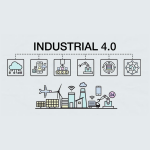Data is Useless
They say that only 1% of the world’s data is being used.
When I entered the world of manufacturing, I was obsessed with that 1% of data. Convinced of its value, I manually searched the data for meaning and insights to improve the process and make things work better on the shop floor. I was a slave to those spreadsheets. It took way too much time and all my attention. I was also neglecting the team on the shop floor because I had my nose in numbers. I was data rich but information poor.
Consider this question: After working on spreadsheets for 1% of data, are we changing anything? Put another way, does that data incite action?
Once I realized that data involves more than infinite spreadsheets, I could look at the whole picture. A tweak here, a process change there, and things started to work better. We were producing quicker and becoming more profitable. It wasn’t about the data – it was about taking action based on what the data was telling us.
I learned the hard way that without action, data is useless. It’s numbers on a spreadsheet and nothing more. The real value occurs when we use that data to identify an opportunity and make a change.
While I am in the technology business now, this concept has nothing to do with fancy gadgets or artificial intelligence. AI can certainly help to mine data and recommend actions, but it is us human beings who have the power to make the change.
Take GPS, for example. GPS does a great job at giving me the best and fastest route to get to work. However, it doesn’t drive or steer the car for me. It gives me information and I decide how I will use that information. The value is in the action I take or, in this case, the route I choose. If I take no action and drive the way I want based on instinct, there’s little value to having GPS at all.
Artificial intelligence tools are certainly changing the way we work in manufacturing. It can transform how manufacturers can use their data. Instead of accumulating and analyzing data at the end of the week or month, manufacturers can access that data, and those valuable insights, in real-time. Instead of wondering what all that data means, AI recommends immediate action. AI and the data it mines, however, are useless without informed action.
The manufacturing industry has only just begun leveraging data, but the operational and performance payout is great. To name a few of the top benefits:
- Better forecasts of product demand and production;
- Understanding plant performance across multiple metrics;
- Faster service and support to customers;
- Real-time alerts;
- Connection between process and business objectives; and
- Correlation across multiple plants.
Key Takeaway: Being competitive in manufacturing means exploring new ways to do business and there’s no lack of tools to help us with data analysis. But without action, data are just more numbers on a report. Real change will happen when we take action and change behaviour.



